Share
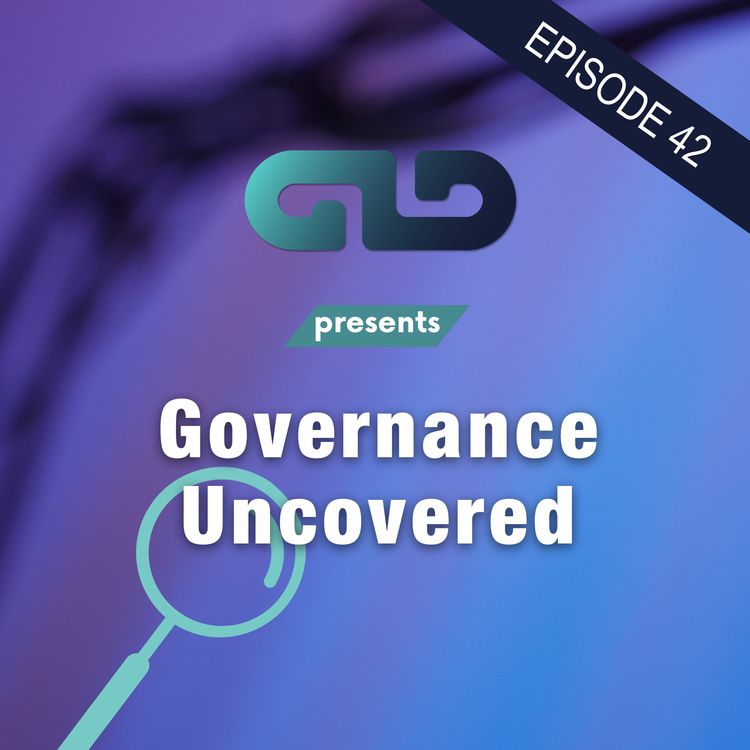
Governance Uncovered
Protests in Iran, Climate Change in the MENA, and Land Politics in Senegal and Zambia
We are excited to let you know that GLD is introducing a new podcast format this month! From now on, you'll hear three shorter segments from three different guests on current events, academic publications, new research, and policy-targeted content. So, in this episode, we'll hear from Rouzbeh Parsi on the protests in Iran: is it a revolution happening or not?
Then, I spoke to my GLD colleagues Ghadeer Hussein and Thabit Jacobs about the policy roundtable series GLD and Alternative Policy Solutions recently held on climate change and environmental justice in the MENA region.
Finally, Ellen Lust met with GLD associate Lauren Honig to talk about her new book on land titling and customary authorities in Senegal and Zambia called "Land Politics: How Customary Institutions Shape State Building in Zambia and Senegal." We hope that you enjoy this episode and the new format.
More episodes
View all episodes
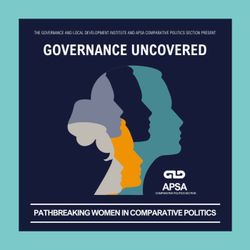
72. Pathbreaking Women in Comparative Politics: Valerie Bunce on Taking Chances and Living Change
01:13:41||Season 1, Ep. 72This episode features an interview with Cornell Professor Emerita Valerie Bunce, conducted by Frances Cayton, a PhD student in the Department of Government, and Prisca Jöst, a post-doctoral fellow in the Jeb E. Brooks School of Public Policy, at Cornell University on May 23, 2025.Professor Valerie Bunce is one of the most influential voices in comparative politics and international relations. Professor Bunce is the Aaron Binenkorb Professor of International Studies Emerita and Professor of Government at Cornell University, where she previously served as director of the Institute for European Studies. A member of the American Academy of Arts and Sciences since 2010, an author of several pivotal books, including Subversive Institutions: The Design and the Collapse of Socialism and the State, her research has significantly shaped our understanding of democratization, authoritarianism, and post-communist transitions.See here for an abridged interview published in the APSA Comparative Politics Newsletter, a glossary of names and terms, and a long-form version of the interview.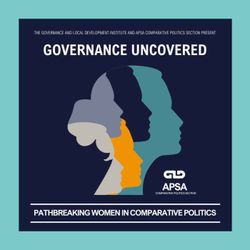
71. Pathbreaking Women in Comparative Politics: Barbara Geddes on Marrying Theory and Evidence in the Study of Political Regimes
01:09:00||Season 1, Ep. 71This episode features an interview with Barbara Geddes, conducted by Department of Political Science at Yale University graduate students Jonathan Elkobi and Saumyaa Gupta via zoom on April 17, 2025.Professor Barbara Geddes has fundamentally reshaped how political scientists understand authoritarian regimes, state capacity and institutional development. She is currently Professor Emerita of Political Science at UCLA. Born in 1944, she went back to school in her 30s, earning her BA (1978) and then PhD (1986) in political science from the University of California, Berkeley. Widely recognized for her path-breaking theoretical contributions to our understanding of authoritarianism and democratization, she also has also influenced our thinking about research design in comparative politics. Over the course of her career, she has chaired more than 50 dissertations and served as a committee member for more than 50 additional advisees. In 2025, the Comparative Politics Section of the American Political Science Association established the Barbara Geddes Award for Lifetime Achievement in Research, Teaching, and GraduateMentoring in her honor.See here for an abridged interview published in the APSA Comparative Politics Newsletter, a glossary of names and terms, and a long-form version of the interview.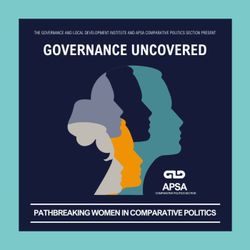
70. Pathbreaking Women in Comparative Politics: Susan Rose-Ackerman on Corruption, Executive Power, and Policymaking
42:08||Season 1, Ep. 70This episode features an interview with Professor Susan Rose-Ackerman that was conducted by Nyché Andrew and Manasi Rao in New Haven, CT on April 3, 2025.Professor Susan Rose Ackerman is one of the most influential scholars in the fields of law and political science; she is currently the Henry R. Luce Professor Emeritus of law and political science at Yale University. Born in 1942 in Mineola, New York, she began her career on a National Science Foundation fellowship, earning a PhD in Economics at Yale University in 1970. She worked for the Council of Economic Advisors in the Johnson and Nixon administrations, and she has held faculty positions at the University of Pennsylvania (1969-1974), Columbia University (1982-1987) and Yale University (1974-1982, 1987-present). Her research has been foundational to the study of corruption, the democratic accountability of the executive branch, and administrative law. Her groundbreaking book Corruption and Government has been translated into 17 languages and won the Charles H. Levine Prize. She is the author of eight additional books on topics including corruption, environmental policy, bureaucracy, and comparative public law. Over the years, her research interests have evolved from a focus on the American context to a comparative perspective, including field research in Eastern and Western Europe, Germany, and France.See these links for an abridged interview published in the APSA Comparative Politics Newsletter, a glossary of names and terms, and a long-form version of the interview: http://bit.ly/4oLj98A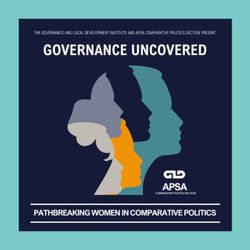
69. Pathbreaking Women in Comparative Politics: Margaret Levi on Power, Trust, and the State
01:23:32||Season 1, Ep. 69Governance Uncovered is brought to you by the Governance and Local Development Institute at the University of Gothenburg, and supported by the Swedish Research Council. This episode is the first in a special series in collaboration with Kate Baldwin at Yale University, featuring interviews with pioneering women who have left a lasting mark on political science. In this episode we are joined by Margaret Levi, Professor Emerita of Political Science and Senior Fellow at the Freeman Spogli Institute at Stanford, as well as the Jere L. Bacharach Professor Emerita of International Studies at the University of Washington and one of political science’s most influential voices. Yale graduate students Siu Yu Lo, Victor Wu, and Fiona Kniaz interview Professor Levi about her remarkable journey from her early experiences with the Civil Rights Movement to her trailblazing scholarly contributions. Professor Levi discusses her transition from urban to comparative politics, reflected in her books Bureaucratic Insurgency and Of Rule and Revenue, one of the earliest major works of rational choice theory in comparative politics. Levi also reflects on her collaboration with economist Doug North and her evolution from Marxist theory to rational choice approaches, highlighting how political transaction costs became central to understanding politics and power.Listen to learn how Professor Levi's research revolutionized comparative politics and influenced generations of scholarsABRIDGED TRANSCRIPT, UNBRIDGED TRANSCRIPT AND GLOSSARY: bit.ly/4lFuV1r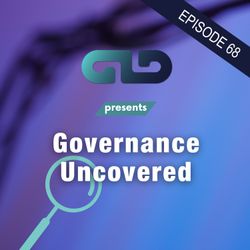
68. Decentralization and Inequality: Lessons from the MENA Region
01:14:27||Season 1, Ep. 68Governance Uncovered is brought to you by the Governance and Local Development Institute at the University of Gothenburg, and supported by the Swedish Research Council. In this episode, we are joined by Ryan Knox, Souraya Hammoud, and Gunnar Andersson from SALAR International during the GLD-SALAR book launch event, featuring discussions around GLD’s recent edited volume, Decentralization, Local Governance, and Inequality in the Middle East and North Africa edited by Kristen Kao and Ellen Lust.The panel addressed the topic of decentralization and local governance through discussion of practical experiences from working in Iraq, Lebanon, Syria, and elsewhere in the MENA Region. It focused on the strategic value of engaging in fostering decentralisation, local governance, and local sustainable development in the MENA Region.Across different settings, these experiences showcase the continuous work of local officials, partners, and community members in building effective governance from the ground up.EPISODE TRANSCRIPT: https://bit.ly/GLD0168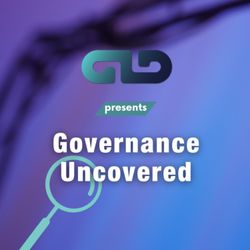
67. Mirages of Reform: The Politics of Elite Protectionism in the Arab World
39:37||Season 1, Ep. 67In this episode, we welcome Steve Monroe to discuss his newest book, Mirages of Reform: The Politics of Elite Protectionism in the Arab World (Cornell University Press, 2025). Together, Steve and Ellen examine how elites across the Arab world maintain economic privileges despite apparent trade liberalization.Steve sheds light on how conventional measures of economic reform often miss the real story. While many Arab nations adopted neoliberal policies on paper, he demonstrates how "neo-patrimonial protectionism" allowed well-connected elites to preserve their advantages through informal mechanisms, like preferential procurement and insider access.Through detailed case studies and quantitative evidence, Steve illuminates the critical gap between formal policy changes and practical implementation, challenging our understanding of economic reform and highlighting how social connections fundamentally shape who benefits from liberalization efforts in the region.Steve argues that geopolitics and social connections between state and capital underpin the Arab world's uneven trade policies. Drawing on interviews, firm- and industry-level data, and evidence from Jordan to Morocco, Mirages of Reform reveals how international and domestic factors interact to shape the Arab world's rugged trade policy terrain. Insightful and well researched, this book imparts important lessons and warnings about the repercussions of economic reform in the region.Full podcast transcript can be found: https://bit.ly/GLD0167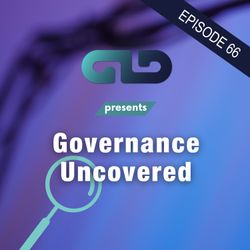
66. What is Next for Syria? Challenges and Opportunities
01:20:46||Season 1, Ep. 66Governance Uncovered is brought to you by the Governance and Local Development Institute at the University of Gothenburg, and supported by the Swedish Research Council. This policy roundtable discussion was made possible through a grant project from the Carnegie Corporation of New York.In this episode, we delved into the intricate governance, economic and security issues confronting post-Assad Syria. Our panelists examined how the fragmented landscape of governance, worsening economic conditions, and environmental challenges impact various communities and locales. The conversation also highlighted the vital roles that local elites and international organizations play in shaping the future of Syria.Guests: Aziz Hallaj, Co-founder and Partner at LUGARIT and Consultant on Urban Planning, Development and Local Governance Ezra Karmel, Director of Proximity InternationalRoundtable Facilitator: Marwa Shalaby, Assistant Professor, Departments of Gender and Women’s Studies and Political Science at the University of Wisconsin-Madison.Moderator: Ellen Lust, Founder and Director of GLD, Professor at Cornell University and University of Gothenburg and Director of the Einaudi Center for International Studies at Cornell UniversityEPISODE TRANSCRIPTION: https://bit.ly/GLD00166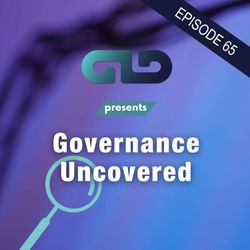
65. Decentralization in the MENA: Representation, Gender, and Civic Engagement
39:25||Season 1, Ep. 65EPISODE TRANSCRIPTIONGovernance Uncovered is brought to you by the Governance and Local Development Institute at the University of Gothenburg, and supported by the Swedish Research Council.In this episode, we discuss some of the research behind the new book Decentralization, Local Governance, and Inequality in the Middle East and North Africa, edited by Kristen Kao and Ellen Lust, and supported by the Hicham Alaoui Foundation. Joining us are three contributing authors who explore critical aspects of decentralization in the MENA region.Guests:Carolyn Barnett, Assistant Professor in the School of Government and Public Policy and the School of Middle Eastern and North African Studies at the University of Arizona.Alexandra Blackman, Assistant Professor at the Department of Government, Cornell University.Steve Brooke, Aassociate Professor in Political Science and Faculty Director of Middle East Studies, both at the University of Wisconsin-Madison.Book: Kao, K., & Lust, E. (2025). "Decentralization, Local Governance, and Inequality in the Middle East and North Africa." University of Michigan Press. Get Open Access here!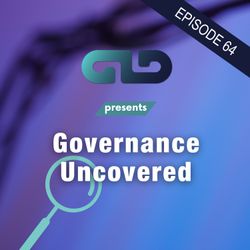
64. Claim-Making in Comparative Perspective
32:05||Season 1, Ep. 64EPISODE TRANSCRIPTIONIn this episode, we are joined by Gabrielle Kruks-Wisner to discuss her Cambridge Element, Claim-Making in Comparative Perspective: Everyday Citizenship Practice and Its Consequences, co-written with Janice Gallagher and Whitney Taylor. Gabi and Ellen explore how everyday claim-making strategies help citizens fulfill their rights. Gabi highlights that claim-making is often overlooked in political behavior studies, which usually focus on elections, mass protests, high court decisions, and legislative actions. This raises the question: What about the politics of the everyday? The Element and this interview address this question through research from Colombia, South Africa, India, and Mexico. Examples include families in Mexico seeking information about disappeared loved ones, citizens in rural India securing basic services like clean drinking water and education, and the fight for housing and healthcare rights in Colombia and South Africa. Despite different contexts, all these cases highlight the persistent, often mundane efforts of citizens engaging with bureaucrats and appointed officials to claim their rights.